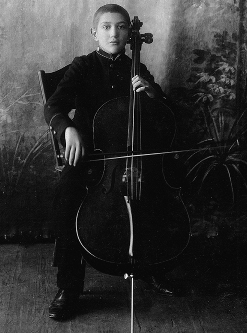Gregor Piatigorsky (1903-1976)
/Gregor Piatigorsky was born on April 17, 1903 in Ekaterinoslav (now Dnipropetrovsk in Ukraine). He began the cello at the age of 7 studying with his father. Two years later, he won a scholarship to the Moscow Conservatory. By the age of fifteen he was both principal cellist of the Bolshoi Opera Orchestra and the "Lenin String Quartet."
In 1921, Piatigorsky fleed the tyranny of Russia to Poland, barely eluding the shots of the border guards. His cello was destroyed in the dramatic events. His stint as principal cellist of the Warsaw Symphony was short lived when left for Leipzig to study with cello pedagogues Julius Klengel and Hugo Becker.
After rather fruitless relationships with his teachers, the 19 year old Piatigorsky moved to Berlin where he came to the attention of Wilhelm Furtwangler. Furtwangler arranged an audition for principal cellist of the Berlin Philharmonic. Piatigorsky was given the post, which he held until 1929.
During his time in Berlin, Piatigorsky collaborated with Artur Schnabel and Carl Flesch. Also Richard Strauss heard the young cellist perform Don Quixote and said, “I have finally heard my Don Quixote as I thought him to be." After much success, Piatigorsky decided to leave the Philharmonic for a solo career. Later that year he debuted with the Philadelphia Orchestra and Leopold Stowkowski and the New York Philharmonic with Wilhelm Mengelberg.
In 1937, Gregor married Jacqueline de Rothschild. That fall, after returning to France, they had their first child, Jephta. In 1941 Piatigorsky moved to Philadelphia when he was appointed to the faculty of the Curtis Institute. In the summers he taught chamber music at Tanglewood. The following year he became a US citizen. In 1949 Gregor left Curtis and moved to California to teach at UCLA. Then from 1957-1962 he taught at Boston University. Finally in 1962 he returned to California where he joined Jascha Heifetz on the faculty of the University of Southern California.
Piatigorsky also had a storied chamber music career. He played trios with Heifetz and Rubenstein. He also had a trio with Milstein and Horowitz. In the 60’s he did the enormously successful Heifetz-Piatigorsky Series of concerts and recordings. They collaborated with many great musicians such as William Primrose and Leonard Pennario to name a few.
Piatigorsky’s colorful and expressive musical personality helped to pave the way for the cello as prominent solo instrument. His transcriptions, arrangements and commissioned works have helped shaped the modern cello repertoire. His artistic flare created a rare musical excitement which left an indelible impression on all those who heard him.
Gregor Piatigorsky died at his home in California on August 6, 1976 of lung cancer.
















